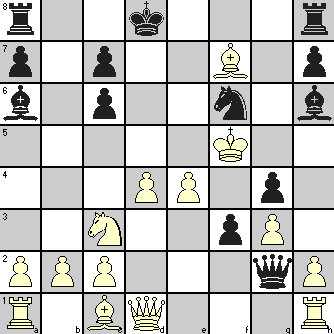Have you ever seen a King move to deliver checkmate to the opponent’s King? Sounds impossible, doesn’t it? Well, of course there is a catch to it as you will see when you play through this game.
Though in “Chess sacrifice to drive the King into open”, we have already shown you examples of chess tactics using sacrifice to force the opponent’s King into open, we could not resist the temptation of showing one more example because of its strange ending! Here the White King is chased by checks and the sacrifices come later to make it almost a neighbor to the Black King which finally delivers the coup d’état.
It is not one of those memorable games you read about in chess related discussions. There was not much of any strategy on the part of White after the initial opening moves which perforce follow the dictates of some chess strategy. Such strategies were thrown out of the window when White continued to grab each and every pawn or piece thrown in his way. As a consequence, he could neither castle nor develop most of his pieces! This game becomes a slugging match using chess tactics only and obviously the player with better tactical ideas wins the game.
The winner was Karel Treybal (1885-1941), one of the strongest Czech players of his time and well-reputed as a natural attacking player capable of creating beautiful combinations. He even defeated better-known chess players like Alekhine, Euwe, Mieses, Tarrasch, Tartakower, Marshall, Burn, Nimzowitsch and Spielmann. Despite winning Czech championship in 1907, he continued in the profession of a lawyer rising to be the chief judge of a county court. Unfortunately for the chess world, he was executed by the Nazis in 1941.
This game also illustrates the need for good chess strategy in keeping with the opening moves. Otherwise, as we have pointed out in “What is chess strategy? Isn’t a chess game all chess tactics?”, only chess tactics will not take you very far. In King’s Gambit Accepted, theory requires White to play 4. h4 after which Black would not be able to play 5. … Qh4+ as in present game. With this opening, White should get a strong center and Black tries counter play on the sides. But White, instead of pursuing this line of chess strategy, went on to use KB to grab pawns and made unnecessary exchange of his centrally positioned Knight. He lost time for development of the center and his Q-side pieces and missed castling, whereas Black continued to press forward his attack. After Black’s 4th move (4…. g4), theory allows White to castle resulting in Muzio Gambit (5. 0-0 gxf3 6. Qxf3) which offers White a strong attack in exchange for the piece, sufficient to get at least a draw, but White did not follow such strategic ideas!
Nonetheless, it is interesting to see how Black offers his pawns and later a Knight, Rook and a Bishop one after another to take the White King where he wanted it! Here follows the game.
| 1. | e4 | e5 | ||
| 2. | f4 | exf4 | ||
| 3. | Nf3 | g5 | ||
| 4. | Bc4 | g4 | ||
| 5. | Ne5 | Qh4+ | ||
| 6. | Kf1 | d5 | ||
| 7. | Bxd5 | Nf6 | ||
| 8. | Bxf7+ | Kd8 | ||
| 9. | d4 | Nc6 | ||
| 10. | Nxc6+ | bxc6 | ||
| 11. | Nc3 | f3 | ||
| 12. | g3 | Qh3+ | ||
| 13. | Kf2 | Qg2+ | ||
| 14. | Ke3 | Ba6 | Black was threatening Bh6# on next move | |
| 15. | Kf4 | Bh6+ | ||
| 16. | Kf5 |
position after White’s 16. Kf5

| 16. | … | Qh3 | ||
| 17. | Kxf6 | Rf8 | White probably thinks that with every enemy piece less, his position improves! |
|
| 18. | d5 | Rxf7+ | All White needs is the time to play dxc6+ to come back into the game, but Black is not obliging! |
|
| 19. | Kxf7 | Qh5+ | Another Black piece offer and White is forced to accept |
|
| 20. | Kf6 | Bg7+ | Another offer that White has to swallow! | |
| 21. | Kxg7 | Qg6+ | ||
| 22. | Kf8 | Kd7# | If the White King expected neighborly love, he was sorely disappointed! But a checkmate by the other King’s move? |


6 Comments
Excellent. Enjoyed it a lot. Keep it up.
Really beautiful game and loved the way you started and all your analysis and comments. This game is indeed strange. I mean just the position which you have posted the white king is on the side of the board.
What a game, that is why I tell my students to go through old games as there are GOLD games to be found.
very well written and indeed a strange game
Thank you for your insight Zaphod.
Adequate compensation for a sacrifice is having a sound combination leading to a winning position; adequate compensation for a blunder is having your opponent snatch defeat from the jaws of victory
Trackbacks/Pingbacks